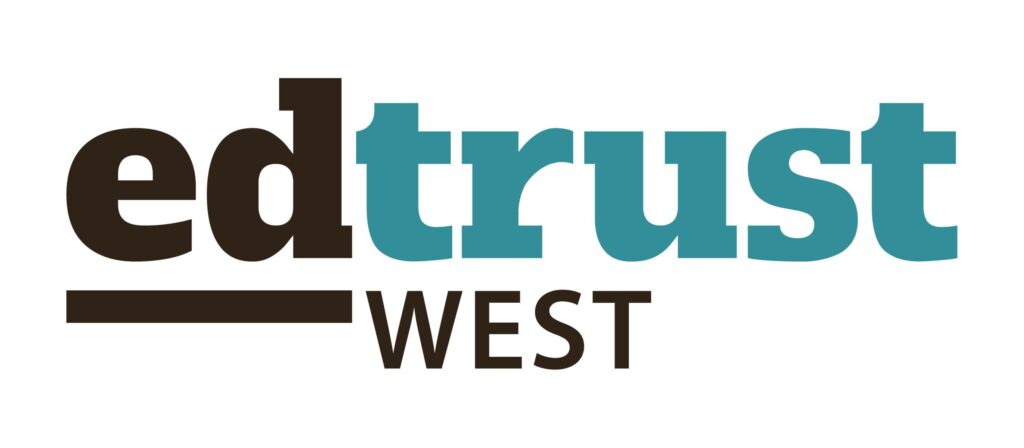This is an exciting moment for California. Soon, every student can access the transformative benefits of an Ethnic Studies course through a new high school graduation requirement. While this policy, signed into law by Governor Gavin Newsom in 2021, is the first of its kind in the nation, Ethnic Studies is not new to California.
To guide the statewide course expansion with an equity-minded approach, EdTrust-West studied Ethnic Studies pedagogy; reviewed academic research; and had many discussions with Ethnic Studies educators and researchers, district and county office administrators, and community advocates to understand what high-quality Ethnic Studies courses can and should look like in high schools.
We hope the recommendations in Seizing the Opportunity will help guide school districts in their initial implementation process to ensure that Ethnic Studies courses fulfill their promise to empower all students, help dismantle racism, and foster a more inclusive, socially just educational experience.
In addition, we created a video that explains the history of Ethnic Studies in California and briefly outlines some of the work in Seizing the Opportunity. We hope it can be shared far and wide to spread awareness about the importance of Ethnic Studies and accurately tell the stories of Black, Latinx, Native American, and Asian American communities.
To support educators and school leaders doing this hard work throughout the state, EdTrust-West calls on Governor Newsom and the legislature to meet the moment and allocate funding in the state budget to support the urgent implementation of the state’s Ethnic Studies graduation requirement.
Relevant State Policy Context:
· By school year 2029-30: Require students to successfully complete at least one semester of Ethnic Studies to graduate.
What is Ethnic Studies and why is it important for all California students?
Angelica Jongco, Deputy Managing Attorney, Education Equity Team at Public Advocates
All students should be free to learn an accurate and inclusive history that reflects the rich diversity, struggles, and contributions of California’s communities. Unfortunately, there are extreme right-wing forces who want to keep the truth hidden by banning books, sanitizing stories of oppression and resistance from our history, and othering vulnerable communities. High-quality Ethnic Studies counteract these dangerous viewpoints. By igniting students’ curiosity and love of learning, Ethnic Studies builds cross-racial solidarity, attracts diverse educators to the classroom, and inspires students from all backgrounds to make an impact in our local communities.
Angela M. Vázquez, MSW, Advocacy Director of Mental Health at The Children’s Partnership
The Children’s Partnership believes that culture is medicine, and have heard directly from young people that investments in positive racial and ethnic identity development are mental health interventions for students of color. Given historical and now escalating threats to children’s health and well-being, especially against those from marginalized communities and identities, ensuring California’s students have a more comprehensive, enriched, and truthful curriculum through Ethnic Studies coursework will bring us closer to securing whole-child health and well-being for all of California’s children and youth.
Martha Hernandez, Executive Director at Californians Together
Ethnic Studies empowers students by honoring the diverse histories, cultures, and contributions that shape our shared society. The implementation of AB 101 ensures that every student gains a deeper understanding of their identity and the world around them. This toolkit is an essential resource, aligned with the English Learner Roadmap, providing educators with the guidance and tools needed to bring Ethnic Studies to life in our classrooms. It is not just about meeting a graduation requirement—it’s about cultivating empathy, critical thinking, and a commitment to equity for all students.
Nazeehah Khan, Policy Director at Californians for Justice
At Californians for Justice, we believe young people are the experts of their experiences, needs, and solutions. EdTrust-West’s guidance reinforces that empowerment by centering youth and giving them the authority to play an active role in the curriculum they consume. An Ethnic Studies course is not only meant to be educational; it is also an avenue towards affirmation and healing for Black & brown youth—and when we bring them into the conversation, that avenue becomes realized.
Sarah Lilis, Executive Director at Teach Plus California
As districts throughout the state move to institute high-quality Ethnic Studies courses, this guide is a robust tool with clear explanations, examples, and key questions. It also reinforces how important it is to foster a collaborative course development process in partnership with community voices—including students, families, and educators.
Manuel Rustin, Ethnic Studies teacher, History Department Chair
I wish I had been able to take Ethnic Studies courses in my own K-12 journey. As a social studies teacher, I know that Ethnic Studies helps students learn what structural or systemic racism actually is, how it plays out, and how we can address such issues together as we build a more just and humanizing world.
Kamila Rivera, Director of K-12 Policy at Generation Up
Young people deserve to learn the histories of their families and communities in ways that are empowering. Ethnic Studies is a critical part of building the healthy, just, and vibrant schools all of our students deserve.

















